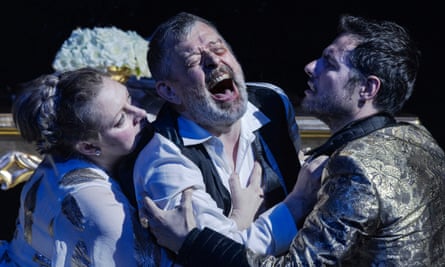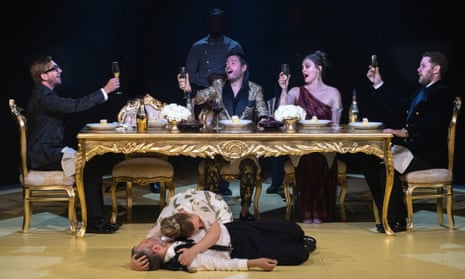An examination of the psychology of power, Tamerlano, first performed in 1724, is one of Handel’s greatest operas, and arguably his darkest. We know its title character better in English as Tamburlaine the Great, the central Asian warlord and emperor, whose life and career were famously dramatised by Christopher Marlowe. Here, as in the play, Tamerlano has overcome the Ottoman empire, but in place of Marlowe’s violent militarist, Handel gives us an unnerving portrait of a sadistic psychopath, playing lethal mind games with his unwanted fiancee, Irene, and also with the deposed Ottoman emperor, Bajazet; the latter’s daughter, Asteria; and Andronico, Asteria’s lover and one of Tamerlano’s unwilling political allies.
Slowly and insidiously accumulating tension, it is a difficult work to get right in the theatre, though Daniel Slater’s new Grange festival staging admirably captures its intensity and sombre ambiguities. Slater hauls the work forward to the present, setting it in a labyrinthine bunker-cum-palace, strikingly designed by Robert Innes Hopkins, where Raffaele Pe’s Tamerlano – charismatic, if deadly, in leather, brocade and bling – toys with the lives and liberties of his prisoners and victims, his manipulations breeding deceit and equivocation in a world in which only Paul Nilon’s morally principled Bajazet values his integrity over his life. Feigning compliance, Sophie Bevan’s Asteria secretly plots murder, while Andronico (Patrick Terry) alternately fawns sycophantically and bribes Tamerlano’s henchmen for the sake of his own and others’ survival. By the end, though, it is apparent that Angharad Lyddon’s proud, calculating Irene will prove more than a match for the man she is determined to control in her turn.

For the most part, it is superbly acted and sung, though Bevan took time to get into her stride on opening night after a tentative start. In the later scenes, her lyricism contrasted nicely with Lyddon’s declamatory fire. Nilon, excellent as always, is all noble, uncompromising dignity throughout. However, the evening ultimately belongs to its two countertenors. Pe, an outstanding artist, is tremendous in the title role, fusing recitative, aria and some exacting coloratura into an utterly compelling portrait of a political monster straying beyond self-control. His vocal and dramatic brilliance nicely offset Terry’s more reflective warmth and tonal beauty; the love-hate relationship between the two men is subtly and deftly captured, too. Robert Howarth is the stylish conductor, and there is impeccable playing from the Bournemouth Symphony Orchestra.
In rep at the Grange festival, Hampshire, until 3 July.

Comments (…)
Sign in or create your Guardian account to join the discussion